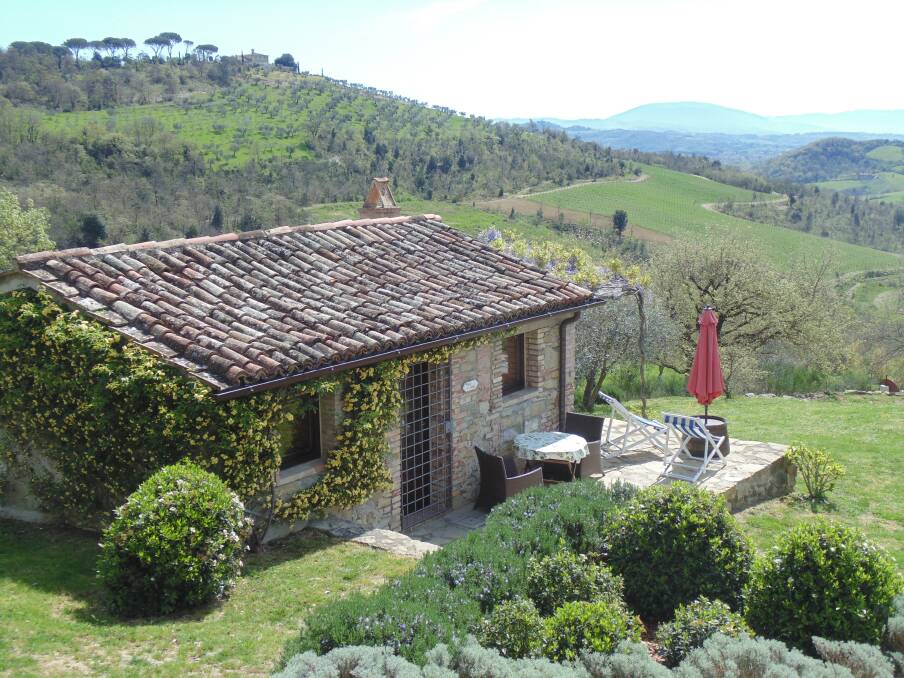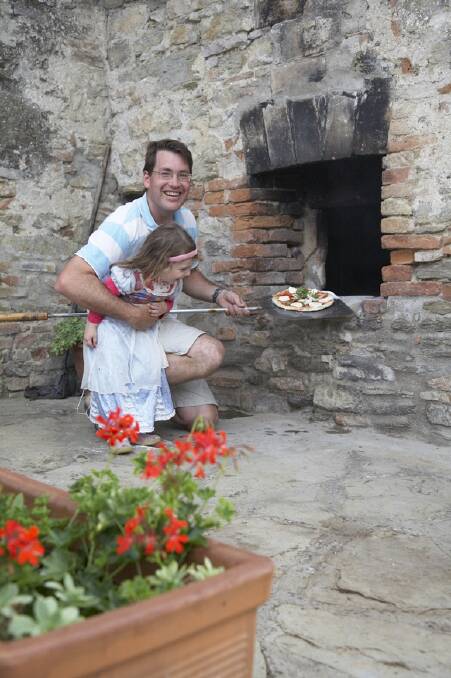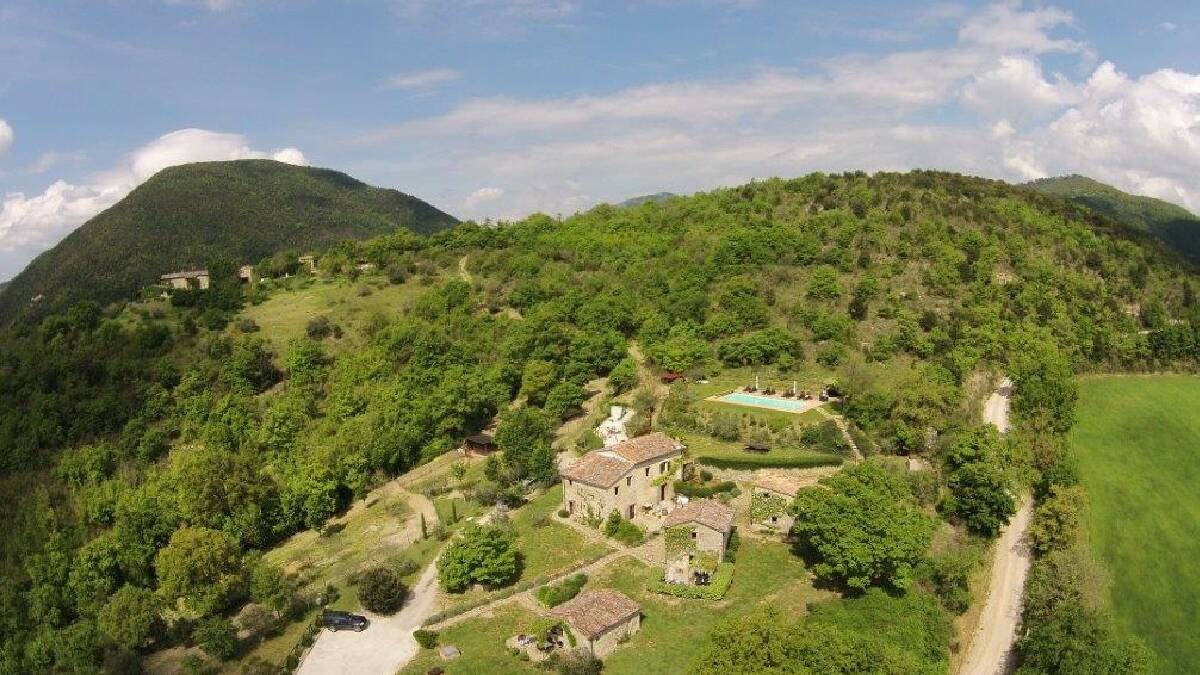ESCAPING to Italy to renovate a historic villa, fossick for black truffles and press olive oil from ancient trees is the dream of many a romantic adventurer.
Subscribe now for unlimited access.
$0/
(min cost $0)
or signup to continue reading

But as many travel shows and books attest, it’s often not an easy task as people struggle with the language barrier, endless bureaucracy and financial pressures.
But as one south-west man has discovered, success can come from determination and the love of a family.
David Lang arrived in Italy 11 years ago as a 29-year-old Australian with the dream of starting a new life. He and his then fiancé, Chrissie, originally decided on a whim to move to a new country during a trip to South America.
“We were visiting a beautiful, old country house in central Mexico called Hacienda San Gabriel,” David explains.
“At the time, Chrissie was working as an accountant and I was a teacher. She was sick of the boardroom battles and office politics, while I was up for a new challenge. We were both taken by the beauty and tranquillity of the old buildings in Mexico.
“One morning, as Chrissie sat in the middle of the courtyard, she turned to me and said: ‘Why don’t we try and buy an old farmhouse in Italy, restore it, you can teach and I’ll rent out a room to travellers — and we can call it Casa San Gabriel.’ And so we began.”
At their next stop in Quito, Ecuador, the couple found an English language bookshop, bought a Lonely Planet guide to Italy and started reading.

They then searched the internet for properties, emailed real estate agents and soon discovered that Tuscany was well and truly out of their price range. Umbria was not far behind, while Le Marche seemed to be the up-and-coming region.
“In the evenings, over drinks with fellow travellers, we started our market research, quizzing people about where they most wanted to go in the world,” David said.
“The overwhelming response was Italy. France seemed to polarise people.
“But those who hadn’t been to Italy were desperate to go — and those who had been, wanted to return. There was obviously a magic about the place.
“I’d never been to Italy, but I had a strong connection with Italians in the area where I grew up at Beeac near Colac.
“Many Italians had rented land from my parents to grow onions. Some of their ancestors had been prisoners of war around our area during World War II — and their families returned afterwards to work and live.
“Chrissie had visited Italy once briefly as a 17-year-old. It’s fair to say we had a fairly romantic idea of life in Italy.”
After finishing their travels and arriving back in England, the pair continued to research the idea while working and organising their wedding.
Chrissie flew with her aunt to Le Marche, on the Adriatic sea in central Italy.
They visited the university town of Urbino, thinking David could find work, but there didn’t yet seem to be enough tourism to guarantee a steady flow of tourists — although there was no shortage of ruins.
The couple then turned their attention to Umbria. The properties were more expensive, but this was pre-GFC and before financial institutions tightened their borrowing regulations.
“A nice Italian bank manager could still be convinced to loan money to two naive young foreigners with the property used as security,” David said.
“With the help of a property finder, we were able to find something that matched our requirements: about one hectare of bush/scrub; separate houses with their own private space so we weren’t living on top of each other; no telephone lines or road noise so our guests could really relax and unwind. Plus a nearby university town, Perugia, where I could find work teaching business and academic English.”
“The walls and roofs were structurally sound but that was about it,” David said. “We needed to install all modern utilities as most of the properties were originally animal accommodation downstairs, providing the heating for upstairs.”
After marrying in the United Kingdom in August 2003, the couple moved to their new Italian home three days later with no electricity, no windows and no doors — into the hottest summer temperatures in 40 years.
“We were lucky that we didn’t need hot water, but the coolest temperature that August was 29 degrees at night.

“Our honeymoon was spent at Casa San Gabriel with lots of friends and family from Australia who had travelled to the UK for the wedding and then joined us in Italy.
“Everyone helped with the cleaning and there is nothing like cleaning when it hasn’t been done for 400 years.
“One of my friends from uni who moonlighted as a pizza chef used a broom handle and a cake tray to make the first pizza slide and get our 16th-century oven back into action.”
Despite taking classes the year before they arrived in their new country, David and Chrissie admit their grasp of the Italian language was initially very weak.
“We had travelled around South America for seven months and had studied Spanish for a few years and so that helped a lot,” David said.
“There is nothing like surrounding yourself with only Italian speakers to make you realise the importance of learning a language.
“We got by with the builders who gesticulated wildly and an Argentinian architect with minimal English, but mostly we learnt through necessity.
“It was a case of sink or swim and we were determined to make our venture a success.”
Eleven years on, an old wine cellar and hayloft have been converted to two self-contained retreats and a former pigsty is now a cosy studio apartment.
The Langs also manage a farm estate which takes up most of the valley surrounding Casa San Gabriel.
It features a four-hectare vineyard, 1100 ancient olive trees, a three-hectare truffle wood, a fishing lake, woodland they cut and sell locally each year and pasture which they bale and sell to local Sardenian farmers who make pecorino cheeses.
“In the middle of the valley is a 12th-century church we rent as well and encourage people to get involved in farming life or just relax and take advantage of the many walks through the hills.”
They are now in the process of reopening a walk used by the retreating Germans during World War II which traverses the valley.
David and Chrissie also have two daughters, Elisabetta (Eli), 9, and Lucia, 7,who both attend the local primary school where they speak Italian all day, then revert to English at home.

“They are a bit confused as their father is Australian, their mother is English and they were both born in Citta di Castello, up the road in Italy.
“I think they will be like a lot of children in the world as people continue to travel and move around in that they will be a mixture of cultures, something that will make people’s understanding of others hopefully easier.”
David said his rural background stood him in good stead for life in the country, and they have the same blue sky days in Umbria that he remembers from Western Victoria.
“Our guests come from all over the world and we enjoy sharing our knowledge of what we think is one of the most beautiful parts of Italy.
“Depending on the time of the year, the spring and autumn guests tend to enjoy visiting many of the wonderful hill towns and villages of the area, soaking up the culture in between breaks for long lunches of wonderful Italian food,” David said.
“We have been fortunate to have lots of people stay with us and enjoy their time in Umbria and pass the word. Consequently, a number of local property owners have asked us to help rent their properties and, on account of our language skills, to help manage them.”
Chrissie’s accounting background and David’s teaching skills have meant they are normally able to manage all the tax, logistical and bureaucratic problems that are part of property ownership in Italy.

During a trip to Australia two years ago, friends and family quizzed them about their future plans and whether they would remain in Italy, return to one of their home countries or start afresh somewhere else.
“We still don’t think that we want to live anywhere else for the moment,” David said.
“We love all the friends we have made in Italy, the bilingualism of our children, the three-course lunches they enjoy at school every day and find helping them with their Italian homework to be extremely challenging.
“We feel very lucky to live where we do and I think home is where your family is.”
www.casasangabriel.com

